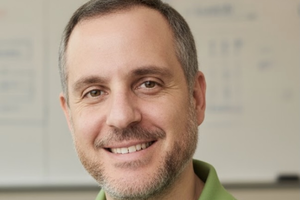by Lini S. Kadaba
As the country emerges from a pandemic that has upended the economy, transformed how people work, and changed in-demand jobs, the role of education is proving ever crucial. At the forefront of workforce development are Penn GSE alumni. They are creating new approaches to readying students and workers for today’s and tomorrow’s workplaces. Here, four alumni representing varied sectors of education—a corporate learning program, a national nonprofit, a community college, and a liberal arts college—share innovative ways they are helping prepare the workers of the future.
Transforming Corporate Learning
As director of learning science and engineering for Amazon, Candace Thille, GRD’13, puts her research into practice for a company of 1.6 million employees, offering a powerful glimpse of how the future of workforce development could look.
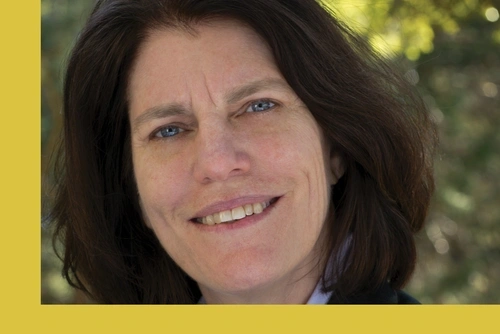
“The knowledge and capabilities people need to develop are changing rapidly,” says the learning science pioneer, who lives in Seattle, Washington. “The old mechanisms are not up to the task.” Leading a team of eighty that includes engineers, product managers, data scientists, learning scientists, and user experience designers, Dr. Thille collaborates with in-house business units such as Amazon Web Services to transform how workers learn.
How does it work? The approach relies on adaptive learning software that customizes the learning experience. Throughout the workday, employees’ devices collect data that are analyzed with algorithms based on Thille’s research. The system makes inferences about the employees’ current knowledge and capabilities relative to their desired knowledge and capabilities and provides guidance and experiences to address each individual’s needs. “The system is constantly monitoring to help the employee decide ‘where I am’ relative to ‘where I’m trying to be,’” says Thille, who has spent two decades working to make education more effective through the learning sciences and technology.
As founder of the Open Learning Initiative (OLI) at Carnegie Mellon University, Thille established courseware to supplement classroom instruction across a variety of subjects and provide ongoing feedback to students, instructors, and course designers. The approach has been shown to help students achieve equal or better learning outcomes in half the time of traditional courses. At Penn GSE, Thille’s thesis for the Executive Doctorate in Higher Education Management program explored aspects of OLI, an effort she continued to lead as a faculty member at Stanford University prior to taking a leave of absence to work for Amazon in 2018.
“The knowledge and capabilities people need to develop are changing rapidly. The old mechanisms are not up to the task.”
At Amazon, Thille notes, the learning system she built has replaced many traditional classes in both technical and non-technical fields such as a boot camp for software engineers and courses on interviewing, management, and coaching. In addition, she says, it helps employees who want to shift jobs within the company develop the necessary skills.
Some might find it all a bit “Big Brother,” but Thille emphasizes that the system operates under clear responsible-use policies.
“We’re collecting learners’ actions not to judge them, but to better support them,” she says, adding that worker agency is at the center of her work.
“How do you frame learning technology so that people see it as supporting them and not replacing them?” asks Thille. “The way I work is not about, ‘If I build this, they will come.’ It’s about collaborating with the business units to co-build so they feel ownership and it’s actually solving their problem.”
Opening Doors to Career Advancement
Increasing access to opportunity for low-income people and people of color is a priority of Jobs for the Future (JFF), and one that resonates on multiple levels with Devon Miner, GED’13. As an associate director for JFF, he works with local and regional players to launch and amplify innovative efforts that connect historically marginalized groups with paths to career success.
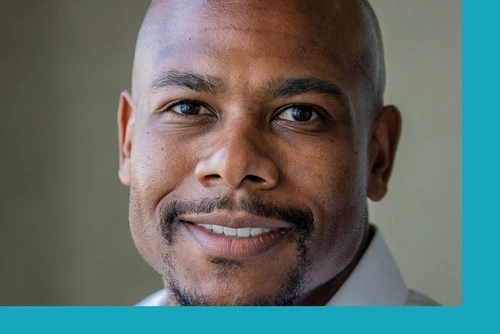
“I’m looking at how we can reskill individuals impacted by the pandemic,” says Miner, who joined the Boston-based nonprofit in the spring of 2021 and works remotely from Los Angeles. “We want to connect them with in-demand training and education opportunities, and then get them matched to in-demand jobs.”
Since COVID-19 hit, Miner says, skilled trades, healthcare, and business development have experienced more industry growth in comparison to hospitality and restaurant industries, while the move to at-home work for many has underscored the importance of closing the digital divide that impacts rural areas and socioeconomically disadvantaged communities.
One groundbreaking project that Miner has helped spearhead is the Bay Area Opportunity Onramps, a collaboration among JFF and other workforce development organizations to place five thousand Bay-area workers with skills—but without four-year degrees—in full-time, middle-wage jobs by 2024. The initiative aims to improve paths to employment for many of the region’s Black, Latinx, and veteran workers. “We’re looking at how we can funnel job seekers into high-demand industries,” Miner says.
Miner has a particular affinity for opening doors to opportunity because of his own trajectory growing up in Inglewood, California, a city that has been historically underinvested. He credits strong role models like his father, a retired probation officer, with his ability to find a path to UCLA and then Penn GSE.
That journey spurred him to make the educational success of students of color his focus during his time in Penn GSE’s Higher Education master’s program. Working with Dr. Shaun Harper, now founder and executive director of the USC Race and Equity Center at the University of Southern California, Miner wrote a thesis about programs and policies that support the success of Black men in college. In addition, he contributed to Harper’s New York City Black and Latino Male High School Achievement Study, which put a spotlight on the factors that students reported as contributing to their success in school.
Those Penn GSE experiences continue to inspire his current work, Miner says. “I’m seeing that when you invest in communities that are often overlooked, give them the proper resources and skills to succeed, they do succeed,” he says.
“I’m seeing that when you invest in communities that are often overlooked, give them the proper resources and skills to succeed, they do succeed.”
Building a Bridge to a Thriving Economy
Workforce development is all about institutional nimbleness, argues Tuesday Stanley, GRD’05, president of Westmoreland County Community College, based in Youngwood, Pennsylvania.
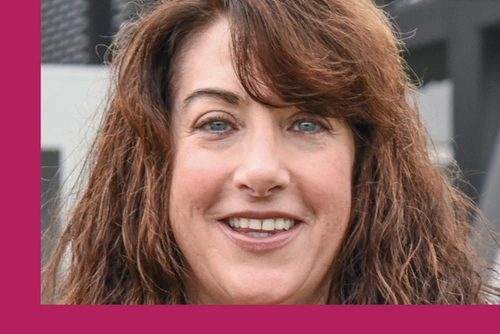
“Community colleges are well poised to get information from employers and train employees and have a continual cycle of feedback throughout,” says Dr. Stanley. Working with about five hundred companies, Westmoreland often creates new course content to meet the demands of these local and regional employers. For example, one company wanted its design engineers to understand the skills of the assembly line technicians. The college came up with a class in a matter of weeks, Stanley says. In another case, Westmoreland supported a company’s training needs due to a shift from traditional to additive manufacturing, or 3D printing.
“We don’t even know what the jobs of tomorrow are going to be. We’re changing our curriculum all the time because the needs are changing all the time,” says Stanley, who gained a strong grounding in leadership in Penn GSE’s Executive Doctorate in Higher Education Management program while serving as vice chancellor of San Jacinto College in Houston, Texas. Since 2014, she has helmed Westmoreland, which enrolls 4,500 students plus 28,000 learners in non-credit classes.
The college has programs for traditional industries like trades and healthcare that still anchor its region, as well as emerging fields such as additive manufacturing and robotics. Its 73,500-squarefoot Advanced Technology Center, opened in 2014, serves as an industry accelerator and offers an array of industry-aligned courses within technology-equipped classrooms and specialized labs. Three start-ups lease space at the center and provide students with internships and jobs.
“We don’t even know what the jobs of tomorrow are going to be. We’re changing our curriculum all the time because the needs are changing all the time.”

Thanks to the technology center and the college’s success in placing graduates in industry positions, Westmoreland was selected in 2019 to deliver a high-level robotics technician training program as part of a $1.8 million federal grant to Massachusetts Institute of Technology. The college also has programs with employers who sponsor students to learn industry-specific skills. In return, graduates, who are often adult learners, are expected to commit to work at the companies for a few years.
While workforce development may be a buzzword right now, community colleges have long played an important role in preparing the workforce, Stanley notes. “Community colleges have been in this space for decades,” she says. “It’s really about helping the businesses and the residents of our community be able to fit together so that the economy thrives.”
Fusing Career Support and The Liberal Arts
Franklin & Marshall College in Lancaster, Pennsylvania, doesn’t have a career services office. Instead, the private liberal arts college boasts the Office of Student and Post-Graduate Development, where Director of Employer and Community Partnerships Sonia L. Elliott, C’88, GED’01, and colleagues work with students from freshman through senior year. “What attracted me to this institution was that it had the most holistic model I’ve ever seen for this kind of work,” says Elliott. The 2,400-student F&M has ventured beyond traditional career services that tend to focus on limited, senior-year support. Instead, F&M’s take on workforce development starts before freshman year at an event for admitted students. It continues with programming offered through college houses, Greek organizations, athletics, and multiple student groups. All are nontraditional venues for career services, Elliott notes.
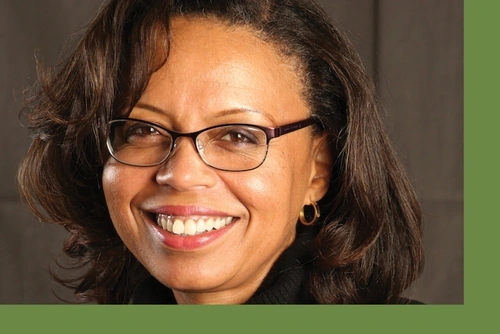
“We are everywhere,” she adds. “We’re going to find your child as a freshman—it doesn’t matter if they aren’t sure about what they want to do. We’re helping them to start having the conversation and try things out.”
“We’re going to find your child as a freshman—it doesn’t matter if they aren’t sure about what they want to do. We’re helping them to start having the conversation and try things out.”
Over the course of a student’s four-year experience, the Office of Student and Post-Graduate Development offers hundreds of touch points, Elliott says. Her focus on employers includes not only job fairs, but also job seeker boot camps with alumni, winter break mini-internships, and immersion trips exploring various industries. “I try to give students different perspectives on what a particular industry is,” Elliott says.
As she works to strengthen F&M’s relationships across industries and sectors, Elliott draws on a background of leading higher education initiatives and developing community and corporate partnerships. She began her higher education career at Penn and joined F&M in 2015 after serving in posts at Temple University, the Philadelphia Mayor’s Office, and a charter school management organization. Elliott also draws on her time in the Education, Culture, and Society master’s program at Penn GSE as she seeks to advance diversity, equity, and inclusion. “DEI is not just about students of color,” she says. “It’s about all students. Employers want to know that you understand the importance of inclusion.”
Within six months of graduation, Elliott says, 96.3 percent of F&M’s Class of 2021 was employed or pursuing further education. For Elliott and her colleagues, the work does not stop there. True to its name, the Office of Student and Post-Graduate Development offers lifelong career development to alumni.
“I love what I do,” Elliott says. “Our focus on a strong and diverse liberal arts education encourages our students and alumni to think critically, and ultimately transform theory into practice, in an ever-changing and challenging world.”
This article appeared in the Spring 2022 issue of The Penn GSE Magazine.
Media Inquiries
Penn GSE Communications is here to help reporters connect with the education experts they need.





